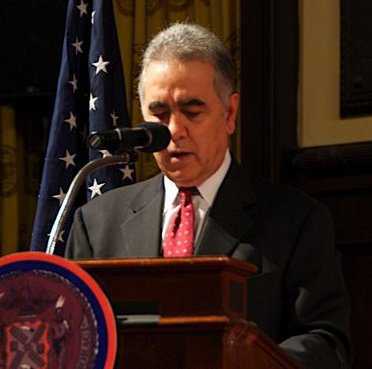Aubrey Herbert, British diplomat, adventurer, intelligence officer, and Member of Parliament, conducted a rare interview with Talaat Pasha, in February 1921, just days before his assassination in Berlin by Soghomon Tehlirian.
As all-powerful Grand Vizier of the Ottoman Empire, its despotic ruler and mastermind of the Armenian Genocide, Talaat had fled Turkey in November 1918 to avoid prosecution by the new regime. The 23-page interview with Talaat was published in 1924 (London) and 1925 (New York) in Herbert’s memoirs titled, “Ben Kendim: A Record of Eastern Travel.”
Herbert first met Talaat in 1908 while stationed at the British Embassy in Constantinople (Istanbul). Eleven years later, Herbert received an unexpected letter from Talaat seeking a meeting with him “in any neutral country.” Desperately seeking to rehabilitate his diabolical image in the West, Talaat claimed that “he was not responsible for the Armenian massacres, that he could prove it, and that he was anxious to do so.” Herbert turned down Talaat’s request telling him: “I was very glad to hear that it was not he who was responsible for the Armenian massacres, but that I did not think any useful purpose could be served by our meeting at that time.”
However, Herbert reversed his decision in February 1921, after Sir Basil Thomson, Director of British Intelligence, ordered him to leave immediately for Germany and meet Talaat. The secret rendezvous took place on February 26, in the small German town of Hamm.
Talaat told Herbert again that “he himself had always been against the attempted extermination of the Armenians.” More incredibly, Talaat claimed that “he had twice protested against this policy, but had been overruled, he said, by the Germans.”
Forgetting his own claims of innocence in the massacres, Talaat justified the mass killings by accusing Armenians of stabbing his country in the back during the war. Contradicting himself again, Talaat declared his support for Armenians by claiming that “he was in favor of granting autonomy to minorities in the most extended form, and would gladly consider any proposition that was made to him.”
Talaat then switched the blame to the British for the Armenian killings: “You English cannot divest yourselves of responsibility in this matter. We Young Turks practically offered Turkey to you, and you refused us. One undoubted consequence has been the ruin of Christian minorities, whom your Prime Minister has insisted on treating as your allies. If the Greeks and Armenians are your allies when we are at war with you, you cannot expect our Turkish Government to treat them as friends.”
Herbert and Talaat then decided to move to Dusseldorf, Germany, where they continued their discreet conversation for two more days. Herbert reported Talaat’s paradoxical attempt to cover up his role in the Armenian Genocide, while justifying this heinous crime. Talaat stated that “he had written a memorandum on the Armenian massacres which he was very anxious that British statesmen should read. Early in the war, in 1915, the Armenians had organized an army, and had attacked the Turks, who were then fighting the Russians. Three Armenian deputies had taken an active part; the alleged massacres of Moslems had taken place, accompanied by atrocities on women and children. He had twice opposed enforced migration, and he had been the author of an inquiry which resulted in the execution of a number of guilty Kurds and Turks.”
Ironically, Talaat boldly told Herbert that he was not afraid of being assassinated. “He said that he never thought of it. Why should anyone dislike him? I said that Armenians might very well desire vengeance, after all that had been written about him in the papers. He brushed this aside.” Two weeks later, Talaat was assassinated in Berlin by Soghomon Tehlirian!
Concluding his interview of Talaat, Herbert observed: “He died hated, indeed execrated, as few men have been in their generation. He may have been all that he was painted — I cannot say. I know that he had rare power and attraction. I do not know whether he was responsible or not for the Armenian massacres.”
Only experts of that time period can verify the authenticity and accuracy of this lengthy interview. If true, what exactly were Talaat’s aims in proposing “an Anglo-Turkish alliance” and why was the British government so anxious to talk to him?



